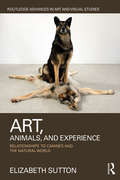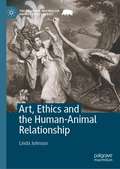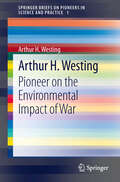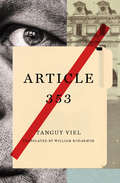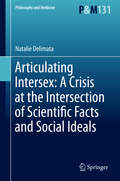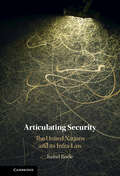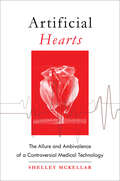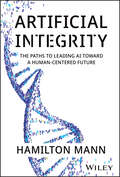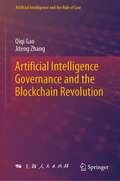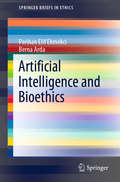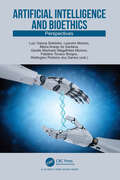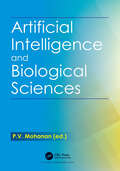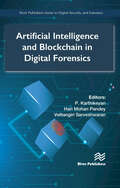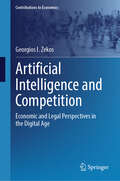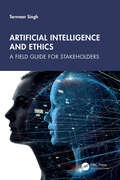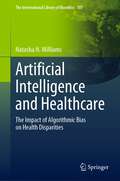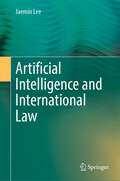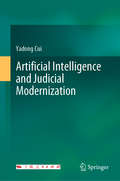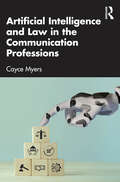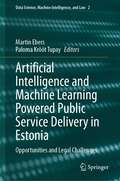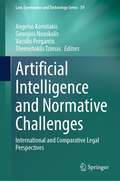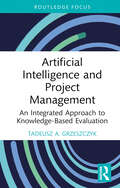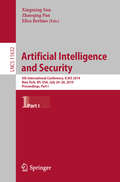- Table View
- List View
Art, Aesthetics and International Justice
by Marina AksenovaThis book demonstrates that art is implicit in the process of administration of international justice. The diverse nature of recent global threats as well as an overwhelming pull towards isolationism and nationalism challenge the dominant deterrence paradigm of international governance created in the aftermath of the Second World War. An alternative model is to focus on cooperation, and not deterrence, as a guiding operational principle.This volume focuses on the theoretical component linking justice with aesthetics as well as on the practical manifestation of such connection evident, inter alia, in the rhetoric of international courts, their architectural design and their commemorative practices expressed by the practice of symbolic reparations adopted by some of the courts. The underlying premise of the book is that international justice requires new vocabulary and new approaches, which can be derived from the study of aesthetics. It is held that exploring the aesthetical dimension of international justice contributes to the discussion on the foundations of its authority and the grounds for compliance with it. The work engages deeply with the theory of aesthetics developed by Immanuel Kant and Abhinavagupta, a Kashmiri critic, philosopher and scholar writing in the early eleventh century.The book will be of interest to academics and researchers working in the areas of Legal Philosophy, International Criminal Justice and International Law and International Relations.
Art, Animals, and Experience: Relationships to Canines and the Natural World (Routledge Advances in Art and Visual Studies)
by Elizabeth SuttonElizabeth Sutton, using a phenomenological approach, investigates how animals in art invite viewers to contemplate human relationships to the natural world. Using Rembrandt van Rijn’s etching of The Presentation in the Temple (c. 1640), Joseph Beuys’s social sculpture I Like America and America Likes Me (1974), archaic rock paintings at Horseshoe Canyon, Canyonlands National Park, and examples from contemporary art, this book demonstrates how artists across time and cultures employed animals to draw attention to the sensory experience of the composition and reflect upon the shared sensory awareness of the world.
Art, Ethics and the Human-Animal Relationship (The Palgrave Macmillan Animal Ethics Series)
by Linda JohnsonThis book examines the works of major artists between the seventeenth and nineteenth centuries, as important barometers of individual and collective values toward non-human life. Once viewed as merely representational, these works can also be read as tangential or morally instrumental by way of formal analysis and critical theories. Chapter Two demonstrates the discrimination toward large and small felines in Genesis and The Book of Revelation. Chapter Three explores the cruel capture of free roaming animals and how artists depicted their furs, feathers and shells in costume as symbols of virtue and vice. Chapter Four identifies speciest beliefs between donkeys and horses. Chapter Five explores the altered Dutch kitchen spaces and disguised food animals in various culinary constructs in still life painting. Chapter Six explores the animal substances embedded in pigments. Chapter Seven examines animals in absentia-in the crafting of brushes. The book concludes with the fish paintings of William Merritt Chase whose glazing techniques demonstrate an artistic approach that honors fishes as sentient beings.
Arthur H. Westing: Pioneer on the Environmental Impact of War (SpringerBriefs on Pioneers in Science and Practice #1)
by Arthur H. WestingSince the 1960s the environment has become an issue of increasing public concern in North America and elsewhere. Triggered by the Second Indochina War (Vietnam Conflict) of 1961-1975, and further encouraged by the International Conference on the Human Environment, held in Stockholm in 1972, the environmental impact of war emerged and grew as a topic of research in the natural and the social sciences. And in the late 1980s this led additionally to a focus and debate on environmental security. Arthur Westing, a forest ecologist, was a major pioneer contributing and framing both of those debates conceptually, theoretically, and empirically, starting with Harvest of Death: Chemical Warfare in Vietnam and Cambodia (1972) (co-authored with wildlife biologist E.W. Pfeiffer and others). As a Senior Researcher at the Stockholm and Oslo International Peace Research Institutes (SIPRI and PRIO), and as a Professor of Ecology at Windham and Hampshire Colleges, Westing authored and edited books on Ecological Consequences of the Second Indochina War (1976), Weapons of Mass Destruction and the Environment (1977), Warfare in a Fragile World: Military Impact on the Human Environment (1980), Herbicides in War: the Long-term Ecological and Human Consequences (1984), Environmental Warfare: a Technical, Legal and Policy Appraisal (1984), Explosive Remnants of War: Mitigating the Environmental Effects (1985), Global Resources and International Conflict: Environmental Factors in Strategic Policy and Action (1986), Cultural Norms, War and the Environment (1988), Comprehensive Security for the Baltic: an Environmental Approach (1989), and Environmental Hazards of War: Releasing Dangerous Forces in an Industrialized World (1990) --- as well as authoring numerous UN reports, book chapters, and journal articles. This volume combines six of his pioneering contributions on the environmental consequences of warfare in Viet Nam and in Kuwait, on the environmental impact of nuclear war, and on legal constraints and military guidelines for protecting the environment in wartime
Article 353: A Novel
by Tanguy VielThis atmospheric noir novel retraces the steps that led to a murder off the coast of Brittany, probing the relationship between law and justice.In a depressed town on France's northern coast, a man named Martial Kermeur has been arrested for the murder of real estate developer Antoine Lazenec after throwing him overboard. Called before a judge, Kermeur goes back to the beginning to explain what brought him to this desperate point: his divorce, his son's acting out, layoffs at his job, and, above all, Lazenec's dazzling project for a seaside resort. The temptation to invest all of your severance pay in a beautiful apartment with a view of the sea is great. But still, it has to be built. In this subtle, enthralling novel, Tanguy Viel examines not only the psychology of a crime, but also the larger social ills that may offer its justification.
Articulating Intersex: A Crisis at the Intersection of Scientific Facts and Social Ideals (Philosophy and Medicine #131)
by Natalie DelimataThis book explores the ethical dilemma clinicians may face when disclosing a diagnosis of atypical sex. The moment of disclosure reveals an epistemic incompatibility between scientific fact and social meaning in relation to sex. Attempting to assess the bio-psychosocial implications of this dilemma highlights a complex historic antagonism between fact and meaning making satisfactory resolution of this dilemma difficult. Drawing on David Hume, WVO Quine and Michel Foucault the author presents an integrative model, which views scientific fact and social meaning as codetermining threads in one fabric of knowledge. From this epistemic perspective, the ethical dilemma is understood as a tear in the fabric signifying a rupturing of ontological integrity. To mend this tear and resolve the ethical dilemma three metaphysical perspectives are considered: essentialism, naturalism and emergentism. The book’s unique features include: an exploration of the impact of diagnostic disclosure on people with atypical sex (intersex); a synthesis of the epistemic perspectives of social and natural science facilitating interdisciplinary collaboration; a critical evaluation of three metaphysical perspectives on atypical sex (intersex); the application of Hume’s epistemological and moral distinctions to contemporary biomedicine and bioethics. The book’s target audience includes academics, students and professionals whose work intersects the natural and social sciences, and individuals interested in the metaphysics, epistemology and meta-ethics of sex.
Articulating Security: The United Nations and its Infra-Law
by Isobel RoeleWe live in a world of mobile security threats and endemic structural injustice, but the United Nations' go-to solution of strategic management fails to stop threats and perpetuates injustice. Articulating Security is a radical critique of the UN's counter-terrorism strategy. A brilliant new reading of Foucault's concept of disciplinary power and a daring foray into psychoanalysis combine to challenge and redefine how international lawyers talk about security and management. It makes a bold case for the place of law in collective security for, if law is to help tackle injustice in security governance, then it must relinquish its authority and embrace anger. The book sounds an alarm to anyone who assumes law is not implicated in global security, and cautions those who assume that it ought to be.
Artificial Hearts: The Allure and Ambivalence of a Controversial Medical Technology
by Shelley McKellarA comprehensive history of the development of artificial hearts in the United States.Artificial hearts are seductive devices. Their promissory nature as a cure for heart failure aligned neatly with the twentieth-century American medical community’s view of the body as an entity of replacement parts. In Artificial Hearts, Shelley McKellar traces the controversial history of this imperfect technology beginning in the 1950s and leading up to the present day. McKellar profiles generations of researchers and devices as she traces the heart’s development and clinical use. She situates the events of Dr. Michael DeBakey and Dr. Denton Cooley’s professional fall-out after the first artificial heart implant case in 1969, as well as the 1982–83 Jarvik-7 heart implant case of Barney Clark, within a larger historical trajectory. She explores how some individuals—like former US Vice President Dick Cheney—affected the public profile of this technology by choosing to be implanted with artificial hearts. Finally, she explains the varied physical experiences, both negative and positive, of numerous artificial heart recipients. McKellar argues that desirability—rather than the feasibility or practicality of artificial hearts—drove the invention of the device. Technical challenges and unsettling clinical experiences produced an ambivalence toward its continued development by many researchers, clinicians, politicians, bioethicists, and the public. But the potential and promise of the artificial heart offset this ambivalence, influencing how success was characterized and by whom. Packed with larger-than-life characters—from dedicated and ardent scientists to feuding Texas surgeons and brave patients—this book is a fascinating case study that speaks to questions of expectations, limitations, and uncertainty in a high-technology medical world.
Artificial Integrity: The Paths to Leading AI Toward a Human-Centered Future
by Hamilton MannNavigating the transitions to the future of AI—Integrity over Intelligence Envision a world where artificial intelligence can deliver integrity-led outcomes seamlessly, adapting to diverse cultural context, value models, and situational nuances, countering subconscious biases, all while operating in an advanced human-centered manner. This is the promise of Artificial Integrity. In Artificial Integrity, digital strategist, technologist, doctoral researcher, acclaimed management thinker, and seasoned business executive Hamilton Mann emphasizes that the challenge of AI is in ensuring systems that exhibit integrity-led capabilities over the pursuit of mere general or super intelligence. Mann tackles the inadequacies of traditional ethical frameworks in handling the complexities of new AI technologies to make them trustworthy and reliable as they profoundly impact human lives. Introducing the transformative concept of “artificial integrity,” Mann proposes a paradigm shift, defining a “code of design” to ensure AI systems align with, amplify, and sustain human values and societal norms, maximizing integrity-led AI outcomes. Artificial Integrity discusses practical insights into driving a future where AI enhances, without replacing, human capabilities while being inclusive and reflective of diverse human experiences, emphasizing human agency. The book offers: Guiding posts and step-by-step solutions for designing, implementing and continuously aligning AI development to responsibly advance human and artificial co-intelligence Strategies and actionable advice for integrating AI into business and societal structures Practical paths toward managing the transition to the future of AI for human productivity and decision-making while maintaining sustainable trustworthiness Artificial Integrity is essential for anyone involved in AI development, from executives, business leaders, and managers to entrepreneurs, tech enthusiasts and policymakers. It's also perfect for laypeople interested in how AI intersects with society. Dive into this compelling and thought provoking read to ensure you are prepared for the challenges and opportunities that lie ahead in a human-centered AI-driven future.
Artificial Intelligence Governance and the Blockchain Revolution (Artificial Intelligence and the Rule of Law)
by Qiqi Gao Jiteng ZhangThis is the first professional academic work in China to discuss artificial intelligence and blockchain together. Artificial intelligence is a productivity revolution, and its development has a significant and profound impact on global changes. However, at the same time, its development also brings a series of challenges to human society, such as privacy, security, and fairness issues. Therefore, the significance of blockchain is even more prominent. Blockchain is a revolution in production relations, which will propose important solutions to the challenges of privacy, security, and fairness that arise after the development of artificial intelligence. The book not only discusses the problems currently faced by the development of artificial intelligence, as well as the new opportunities and challenges that artificial intelligence brings to future global governance, but also explains the further development direction of the intelligent revolution from the perspective of blockchain.
Artificial Intelligence and Bioethics (SpringerBriefs in Ethics)
by Perihan Elif Ekmekci Berna ArdaThis book explores major bioethical issues emerging from the development and use of artificial intelligence in medical settings. The authors start by defining the past, present and future of artificial intelligence in medical settings and then proceed to address the resulting common and specific bioethical inquiries. The book discusses bioethical inquiries in two separate sets. The first set is comprised of ontological discussions mainly focusing on personhood and being an ethical agent of an artefact. The second set discusses bioethical issues resulting from the use of artificial intelligence. It focuses particularly on the area of artificial intelligence use in medicine and health services. It addresses the main challenges by considering fundamental principles of medical ethics, including confidentiality, privacy, compassion, veracity and fidelity. Finally, the authors discuss the ethical implications of involvement of artificial intelligence agents in patient care by expanding on communication skills in a case-based approach. The book is of great interest to ethicists, medical professionals, academicians, engineers and scientists working with artificial intelligence.
Artificial Intelligence and Bioethics: Perspectives
by Wellington Pinheiro dos Santos Maíra Araújo de Santana Leandro Modolo Luiz Vianna Sobrinho Giselle Machado Magalhães Moreno Fabiano Tonaco BorgesThe fourth industrial revolution challenges humanity ethically and morally: mass unemployment, new forms of colonialism, and mass-and-granular surveillance are a few examples of these challenges. Nevertheless, the industrial revolutions have increased human productivity and quality of life. This book aims to review the ethical challenges related to the use of these technologies. It unfolds bioethical perspectives regarding Artificial Intelligence (AI) and its impact on life on earth. It discusses both northern and southern epistemologies of bioethics. Northern bioethics comprises principles of autonomy, beneficence, non-maleficence, and justice. Southern bioethics gives weightage to struggles for human liberation, social justice, and the pluralism of knowledge. The book discusses topics from aging to mass surveillance, to deliver a universal bioethical guideline to a wide range of professions that work with AI and are concerned about its impact on life. This book will not label AI, but broaden the readers' view of an ethical and explainable AI that works for life on earth.
Artificial Intelligence and Biological Sciences
by P. V. MohananAdvancements of AI in medical and biological sciences have opened new ways for drug development. Novel therapeutic molecules and their target action can be easily predicted and can be modified. AI helps in disease detection and diagnosis faster. The breakthrough of AI is made especially in the area of personalized precision medicine, host-pathogen interaction and predictive epidemiology. These approaches could help in faster decision-making with minimal errors that can improve risk analysis, especially disease diagnosis and selecting treatment strategy. In agricultural practices, an exact combination of fertilizers, pesticides, herbicides, soil management, water requirement analysis, yield prediction and overall crop management can be modified by implementing AI interventions. AI could provide a better improvement in agriculture, medical research, pharmaceuticals and bio-based industries for a sustainable life.The key features of this book are: AI in medical Sciences, biotechnology and drug discovery; Application of AI in Digital Pathology, cytology and bioinformatics; Overview of AI, Machine Learning and Deep Learning; Impact of Artificial Intelligence in Society; Artificial Intelligence in Pharmacovigilance; and Ethics in Artificial Intelligence. The volume aims to comprehensively cover the application of AI in biological sciences. It is a collection of contributions from different authors who have several years of experience in their specific areas. The book will be useful for pharma companies, CROs, product developers, students, researchers, academicians, policymakers and practitioners.
Artificial Intelligence and Blockchain in Digital Forensics (River Publishers Series in Digital Security and Forensics)
by P. Karthikeyan Hari Mohan Pandey Velliangiri SarveshwaranDigital forensics is the science of detecting evidence from digital media like a computer, smartphone, server, or network. It provides the forensic team with the most beneficial methods to solve confused digital-related cases. AI and blockchain can be applied to solve online predatory chat cases and photo forensics cases, provide network service evidence, custody of digital files in forensic medicine, and identify roots of data scavenging. The increased use of PCs and extensive use of internet access, have meant easy availability of hacking tools. Over the past two decades, improvements in the information technology landscape have made the collection, preservation, and analysis of digital evidence extremely important. The traditional tools for solving cybercrimes and preparing court cases are making investigations difficult. We can use AI and blockchain design frameworks to make the digital forensic process efficient and straightforward. AI features help determine the contents of a picture, detect spam email messages and recognize swatches of hard drives that could contain suspicious files. Blockchain-based lawful evidence management schemes can supervise the entire evidence flow of all of the court data. This book provides a wide-ranging overview of how AI and blockchain can be used to solve problems in digital forensics using advanced tools and applications available on the market.
Artificial Intelligence and Competition: Economic and Legal Perspectives in the Digital Age (Contributions to Economics)
by Georgios I. ZekosThis book examines the impact of artificial intelligence on competition and antitrust in today's global digital economy. It scrutinizes the economic and legal ramifications of Artificial Intelligence (AI), addressing the challenges it presents to competition and the law.Beginning with an analysis of AI's developments across various economic sectors, the book highlights the need for updated legislation. It focuses on the digital economy, emphasizing digital platforms' role in shaping competition. Econometric investigations and a novel index assess competition's influence on foreign direct investment and multinational enterprises. Comparing competition practices across jurisdictions like the EU, US, Germany, and China, the book uncovers commonalities and differences in competition law principles. It also explores various theories on competition and competition law, seeking convergence or divergence.This book is an essential resource for scholars, legal professionals, policymakers, and anyone seeking a better understanding of how AI is reshaping competition and antitrust in the digital age.
Artificial Intelligence and Ethics: A Field Guide for Stakeholders
by Tarnveer SinghArtificial Intelligence and Ethics is a general and wide-ranging survey of the benefits and ethical dilemmas of artificial intelligence (AI). The rise of AI and super-intelligent AI has created an urgent need to understand the many and varied ethical issues surrounding the technologies and applications of AI. This book lays a path towards the benefits and away from potential risks. It includes over thirty short chapters covering the widest array of topics from generative AI to superintelligence, from regulation to transparency, and from cybersecurity to risk management. Written by an award-winning Chief Information Security Officer (CISO) and experienced Technology Leader with two decades of industry experience, the book includes real-life examples and up-to-date references. The book will be of particular interest to business stakeholders, including executives, scientists, ethicists and policymakers, considering the complexities of AI and how to navigate these.
Artificial Intelligence and Healthcare: The Impact of Algorithmic Bias on Health Disparities (The International Library of Bioethics #107)
by Natasha H. WilliamsThis book explores the ethical problems of algorithmic bias and its potential impact on populations that experience health disparities by examining the historical underpinnings of explicit and implicit bias, the influence of the social determinants of health, and the inclusion of racial and ethnic minorities in data. Over the last twenty-five years, the diagnosis and treatment of disease have advanced at breakneck speeds. Currently, we have technologies that have revolutionized the practice of medicine, such as telemedicine, precision medicine, big data, and AI. These technologies, especially AI, promise to improve the quality of patient care, lower health care costs, improve patient treatment outcomes, and decrease patient mortality. AI may also be a tool that reduces health disparities; however, algorithmic bias may impede its success. This book explores the risks of using AI in the context of health disparities. It is of interest to health services researchers, ethicists, policy analysts, social scientists, health disparities researchers, and AI policy makers.
Artificial Intelligence and International Law
by Jaemin LeeThis book examines the timely issue of artificial intelligence (AI) and law. At this moment, AI is rapidly developing and being utilized in many different sectors. Meanwhile, the rise of AI raises complex questions and poses new challenges—new products and services involving AI will require new regulations and standards to minimize potential negative side-effects and maximize the benefits of this new technology, both within domestic law and international law. Thus, this book focuses on the impact of AI on international law and seeks ways to develop international law frameworks to adequately address the challenges of the AI era. In this context, new forms of inter-state conflicts and emergence of new subjects and objects of international law are discussed along with relevant up-to-date developments in major jurisdictions. Issues arising from the advent of AI relating to state sovereignty, state responsibility, dispute settlements, and north-south divide are also considered.
Artificial Intelligence and Judicial Modernization
by Yadong CuiThis book comprehensively describes the status quo of artificial intelligence technology applications in the judicial field in China. Written by Cui Yadong, the former President of Shanghai Senior People's Court, it is divided into three parts: the first part focuses mainly on the theoretical issues related to artificial intelligence and judicial applications. The second part highlights practical aspects, discussing the research and development process, the implementation of the"206 system" and the major breakthroughs. The third part then addresses lessons learned and the thinking, particularly the thinking on "building the future rule of law of artificial intelligence", a new topic that responds to people's concerns about the risks and challenges of the development of artificial intelligence. In this context, the book argues that the judicial task is twofold: On the one hand, it should actively promote the integration and application of AI in the judiciary, judicial intelligence, and judicial modernization. On the other hand, it should encourage the construction of a future rule of law system of artificial intelligence, highlight the role of the judiciary in dealing with future risks and challenges, bring the development of artificial intelligence into line with the rule of law, and use the rule of law to promote, standardize and guarantee the safe, reliable and controllable development of artificial intelligence.
Artificial Intelligence and Law in the Communication Professions
by Cayce MyersThis book analyzes the current attempts to regulate artificial intelligence (AI) and its impact on the communication field.Examining existing and proposed laws, policies, and regulations of AI in the U.S. and the European Union, this book analyzes how the technological development of AI will be governed in the next decade and how this will impact the communication industry. Chapters explore the influence of laws on key communication issues including free speech, disinformation, intellectual property, privacy, and discrimination, as well as the AI industry’s approach to self-regulation. It shows how communication professionals such as public relations practitioners, advertisers, and journalists will be affected by generative AI content production and how communication will ultimately be shaped by the regulations and laws placed on AI.Providing readers with a working knowledge of the contemporary legal issues surrounding AI and communication, this book will be of interest to scholars and students in the fields of Media and Communication Law, Public Relations, Advertising, and Journalism.
Artificial Intelligence and Legal Analytics: New Tools for Law Practice in the Digital Age
by Kevin D. AshleyThe field of artificial intelligence (AI) and the law is on the cusp of a revolution that began with text analytic programs like IBM's Watson and Debater and the open-source information management architectures on which they are based. Today, new legal applications are beginning to appear and this book - designed to explain computational processes to non-programmers - describes how they will change the practice of law, specifically by connecting computational models of legal reasoning directly with legal text, generating arguments for and against particular outcomes, predicting outcomes and explaining these predictions with reasons that legal professionals will be able to evaluate for themselves. These legal applications will support conceptual legal information retrieval and allow cognitive computing, enabling a collaboration between humans and computers in which each does what it can do best. Anyone interested in how AI is changing the practice of law should read this illuminating work.
Artificial Intelligence and Machine Learning Powered Public Service Delivery in Estonia: Opportunities and Legal Challenges (Data Science, Machine Intelligence, and Law #2)
by Martin Ebers Paloma Krõõt TupayThis book gives a comprehensive overview of the state of Artificial Intelligence (AI), especially machine learning (ML) applications in public service delivery in Estonia, discussing the manifold ethical and legal issues that arise under both European and Estonian law. Final conclusions and recommendations set out and analyze various policy options for the public sector, taking into account recent developments at the European level – such as the AIA proposal – as well as the experience of countries that have issued principles and guidelines or even laws for the use of ML in the public sector. “For two reasons, this study is relevant not only for an audience which is interested in Estonian administrative law. First, the authors base their legal analysis primarily on EU law and provide a state of the art-analysis of the relevant secondary legislation. This makes the book a reference text for the European debate on public sector AI governance. Second, this study is part of a larger research project in which four specific use cases of public sector AI have been developed and tested. The practical insights gained in these projects have provided the authors with an excellent understanding of the opportunities and risks of the technology, which distinguishes this legal analysis from similar enterprises.” Excerpt from the foreword by Professor Thomas Wischmeyer (University of Bielefeld)
Artificial Intelligence and Normative Challenges: International and Comparative Legal Perspectives (Law, Governance and Technology Series #59)
by Angelos Kornilakis Georgios Nouskalis Vassilis Pergantis Themistoklis TzimasArtificial intelligence (AI) – both in its current, comparatively limited form and even more so in its potential future forms (such as general and superintelligence) – has raised both concerns and hopes. Its actual and potential consequences are increasingly far-reaching, affecting almost every facet of human life on a collective and individual level: from the use of mobile phones and social media to autonomous weapons, and from the digitalization of knowledge and information to the patentability of AI innovations, unexpected philosophical, ontological, political and legal questions continue to arise.This book offers an insightful and essential guide to the scientific questions that are shaping humanity’s present and future. Presenting a collection of academic essays written by prominent scholars, it addresses the major legal issues concerning AI: its impact on a wide range of human behavior and the general legal response, including questions on AI and legal personhood; responsibility, liability and culpability in the age of AI; the challenges AI poses for intellectual property regimes; human rights challenges; and AI’s impact on jus ad bellum and jus in bello.Given its scope, the book will appeal to researchers, scholars and practitioners seeking a guide to this rapidly transforming landscape.
Artificial Intelligence and Project Management: An Integrated Approach to Knowledge-Based Evaluation (ISSN)
by Tadeusz A. GrzeszczykAlthough some people had doubts about the usefulness of such solutions in the past, artificial intelligence (AI) plays a growing role in modern business. It can be expected that the interest in it will also lead to an increase in support for the planning, evaluation, and implementation of projects. In particular, the proper functioning of multifaceted evaluation methods has a crucial impact on the appropriate planning and execution of various projects, as well as the effective achievement of the organization’s goals. This book offers a presentation of the complex problems and challenges related to the development of AI in project management, proposes an integrated approach to knowledge-based evaluation, and indicates the possibilities of improving professional practical knowledge in this field.The unique contribution of this book is to draw attention to the possibilities resulting from conducting transdisciplinary research and drawing on the rich achievements in the field of research development on knowledge-based systems that can be used to holistically support the processes of planning, evaluation, and project management. The concept of the integrated approach to knowledge-based evaluation is presented and developed as a result of drawing inspiration mainly from the systems approach, generative AI, and selected mathematical models.Presented in a highly accessible manner, the book discusses mathematical tools in a simple way, which enables understanding of the content by readers across broad subject areas who may be not only participants in specialist training and university students but also practitioners, consultants, or evaluators. This book will be a valuable resource for academics and upper-level students, in particular, across project management-related fields, and of great interest to all those looking to understand the challenges and effectiveness of AI in business.
Artificial Intelligence and Security: 5th International Conference, ICAIS 2019, New York, NY, USA, July 26-28, 2019, Proceedings, Part I (Lecture Notes in Computer Science #11632)
by Elisa Bertino Xingming Sun Zhaoqing PanThe 4-volume set LNCS 11632 until LNCS 11635 constitutes the refereed proceedings of the 5th International Conference on Artificial Intelligence and Security, ICAIS 2019, which was held in New York, USA, in July 2019. The conference was formerly called “International Conference on Cloud Computing and Security” with the acronym ICCCS.The total of 230 full papers presented in this 4-volume proceedings was carefully reviewed and selected from 1529 submissions. The papers were organized in topical sections as follows: Part I: cloud computing; Part II: artificial intelligence; big data; and cloud computing and security; Part III: cloud computing and security; information hiding; IoT security; multimedia forensics; and encryption and cybersecurity; Part IV: encryption and cybersecurity.

